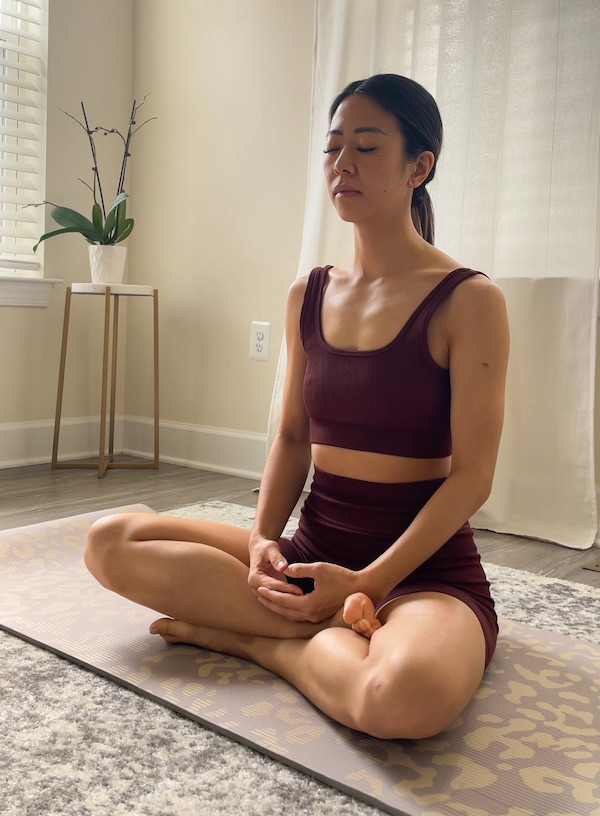
“Be thankful for what you have; you’ll end up having more. If you concentrate on what you don’t have, you will never, ever have enough.” — Oprah Winfrey
If you ask people who know me well to describe me in one word, “bubbly” would probably be one of those words. But for a really long time, I always thought that there was something wrong with me. I remember thinking, “How can someone so optimistic and energetic have such devastating lows?” I was often consumed by my thoughts; thoughts of worries and doubt spiraling out of control if I let it. So ever since I can remember, I always tried to avoid those thoughts, which meant I always had to be stimulated so I wouldn’t be left alone with them.
When I was in college, I was heavily involved in student organizations and volunteer groups. I would help run workshops, conferences, and retreats that aim at building community, and one of the main elements of building community is vulnerability. At these events, there would be team bonding sessions where you share personal stories. A question that often came up was “What is your biggest fear?”
My answer, always: Being alone.
I always knew that I struggled with depression and anxiety because I started seeing a psychiatrist in high school after my first suicide attempt. Then, I had a second attempt in my second year of college. Then my third attempt in my last year of college, one week before I graduated.
For the last decade, this was my life’s biggest question: Why do I keep trying to end my life?
It wasn’t until 2018, when I moved to Vietnam, that I started exploring the answers to this question.
And it was scary.
It felt like going into a dark cave with no flashlight, not knowing exactly what you were looking for but knowing that something is in there, something that might help you make sense of yourself.
I wouldn’t call myself a “woo woo” type of person, so I try to refrain from saying things like “The universe is sending me a sign.” But that’s what it kind of felt like when I upended my comfortable and stable life in America and moved across the world. I had always wanted to live and teach abroad, and despite having financial security, a loving relationship and partner, and being surrounded by supportive friends and family, I decided to move. Alone. By myself, to a place unknown.
Everyone thought I was crazy. Hell, I felt crazy. But there was this constant, undeniable urge inside me that knew this was what I needed. I also knew that if I didn’t do this now, I would never do it, and the last thing I wanted was to have this gnawing ache of “what if”?
Before I moved, I met with my very close friend who truly embodies spirituality, but always balanced with her own sense of realism. She’s also a Tarot reader and expert in astrology and often did my readings whenever I ran out of concrete ideas on my own.
“What’s the universe telling me, Michelle?” I’d often ask, half-jokingly.
Other than my therapist, I would turn to Michelle with all of my chaotic thoughts and she would always say the same thing: “There’s nothing wrong with you.”
She told me about the law of attraction and conscious manifestation and shared how these concepts changed her perspective of the world and turned her life around. She said it is all about the energy that you create and the filters in which you see and understand life. But the ideas behind these beliefs were too “woo-woo” for me to accept, so I didn’t think too much about it.
That was until I moved to Saigon at the end of September 2018. Within the first month of being there, I was introduced to a new network of friends, organizers, and entrepreneurs; all sharing a vibrant and electrifying energy that I had never felt before. One thing was certain – these people really cared about bettering themselves.
Through my immediate connections with people, usually centered around the topic of self-development and self-improvement, the law of attraction and manifestation were ideas that persisted. I remember thinking, “Oh my god, Michelle was really onto something.” Obviously, these concepts have been around for generations, and if you’re seeing this now, you’re probably thinking, “Yeah Jess, old news!”
But this was years ago, before spirituality, mindfulness, and self-care became a trend.
Anyways, I started to do my research. I started to read more about the topic, listened to podcasts (it was during this time that I found my love for podcasts), and watched videos about how it all worked. I realized that these ideas were not complex or improbable theories. It’s hard to believe because people don’t often see the intersection between science and spirituality. After reading numerous memoirs and self-development books and listening to interviews with entrepreneurs, scientists, and thought leaders, one word kept coming up over and over again: Gratitude.
I came to the conclusion that, at the core of it all, gratitude was the key.
Simply put, gratitude is being grateful for the things that you already have in your life. Gratitude is living in abundance, focusing on what you have rather than what you lack. People are constantly thinking, “I don’t have enough money” or “I’m not successful” and “this is never going to work.” I am 100% guilty of this. But what I learned was if you’re telling your mind that, it will believe those thoughts and subsequently, your actions will follow. You can keep working toward a goal, but if you’re clouded by negativity and doubt, you are subconsciously manifesting those negative thoughts into reality.
Lots of “woo woo” words right? I know, so let’s break down the science.
Have you heard of the Cognitive Triangle?
When my therapist first taught me this, it blew my mind. I felt like I had found a flashlight, my first tool, in the dark cave. Now, I can finally see where I’m going.
The Cognitive Triangle is a cycle of your thoughts, feelings, and behaviors, and if left unchecked, can really do some damage. Our thoughts influence how we feel, and our feelings influence our behaviors and actions. In other words, our thoughts are more powerful than we think.
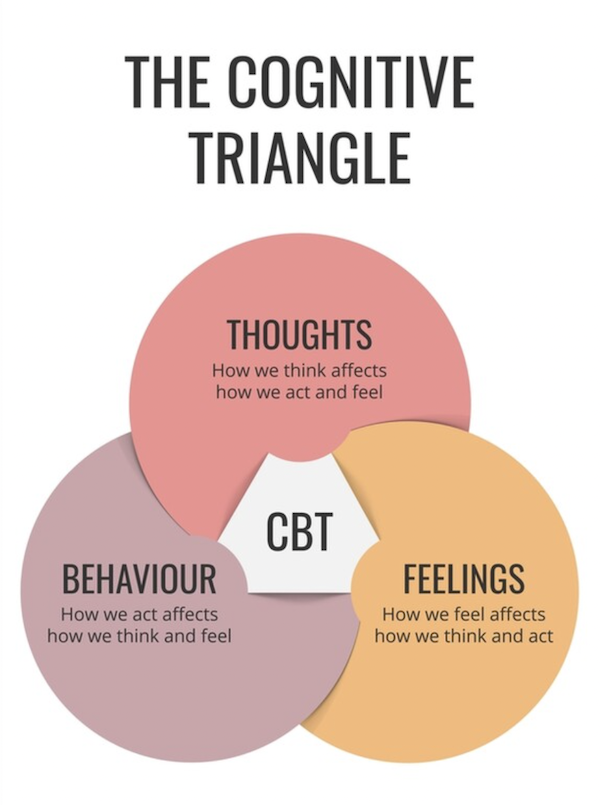
So, how does this relate to gratitude?
Well, it starts with your thoughts.
Being aware and in control of your thoughts is the first step. You might have to question your thoughts. Sometimes, what we think isn’t always true. This was the first step for me in beginning my gratitude journey.
I learned that in order for my mindset to truly change, I had to actually be grateful. I had to believe that there were things to be thankful for. I had to feel grateful. That was the hardest part, trying to force a feeling when your mind had been conditioned to believe something else.
So, as a first step towards redirecting my thoughts, I started writing in a gratitude journal. I found that when I was writing, I was also reflecting. I noticed that my mind started to believe my words, and my heart inevitably followed. I was creating this new feeling of wholeness within me. Every day, I recorded all the things that I felt blessed to have and be able to do. As people, we are so focused on what we lack and what we need more of. But the secret is within the things we already obtain. I would write things like, “I am grateful to have breakfast every morning,” and “I am grateful to have a roof over my head.” I’d also write about my blessings that come in human form. “I am grateful to have supportive people in my life, to hold me accountable to my goals and who are not afraid to tell me how it is, even if it’s not what I want to hear.”
I’m a strong believer in science, so in conjunction with following my beliefs in spirituality, I continued to research the science behind this process of re-wiring my brain. That’s when I came across Dr. Joe Dispenza, a researcher, lecturer, and educator whose work focuses on the connections between neuroscience, epigenetics, and quantum physics, and how all of this proves that we all have the potential for greatness.
Reading Dispenza’s work and listening to his interviews have completely changed my life. The way he integrates spirituality and emotions with how our brains are wired, leading to our body’s functions and actions allowed me to understand how everything is connected in my mind; how a simple thought can create a ripple effect that becomes my action. Here is an excerpt I recorded in my notes from an interview he did with Ed Mylett (one of my favorite people to listen to):
“Most people are waiting for their life to change so they can feel gratitude, so they can feel abundance, feel whole. That’s the old model of cause and effect. If you’re living with emptiness, you’re living with lack, you’re living with pain, most people have been conditioned that something out there has to take away this emptiness or feeling inside of them…
Here’s the key: if you are able to become familiar with gratitude, become familiar with wholeness, become familiar with abundance, become familiar with freedom, and you’re able to generate those chemicals every single day, more than likely, you would be walking around feeling like your future has already happened. You would no longer be looking for it to happen. You would already feel like it has happened. Well, what is the importance of that? You’re literally becoming somebody else. You’re leaving your lack, you’re leaving your guilt, you’re leaving your emptiness behind.”
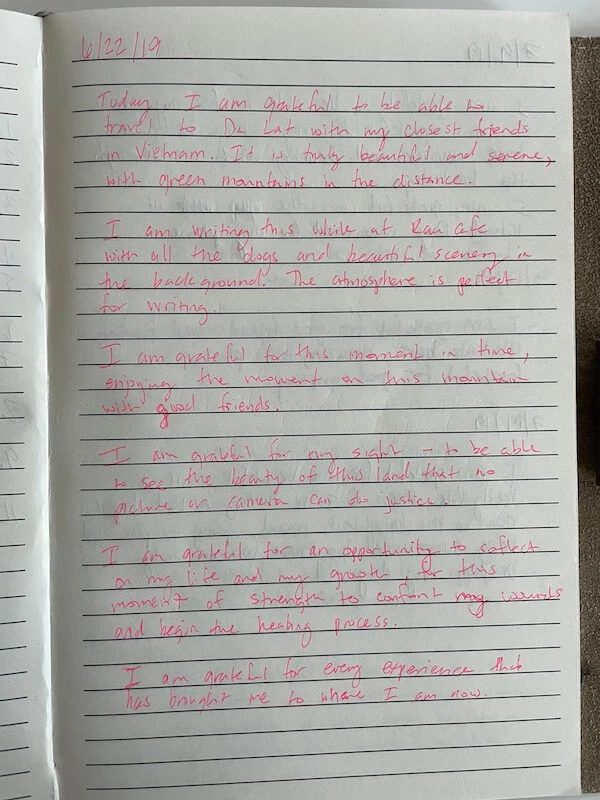
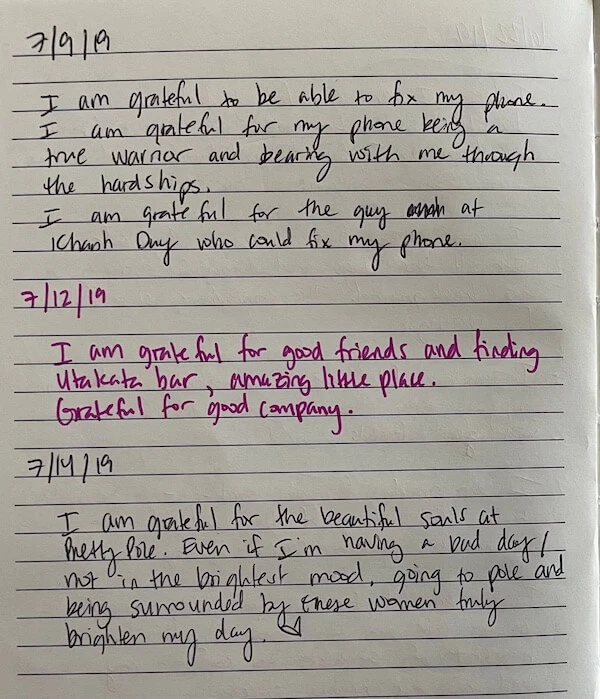
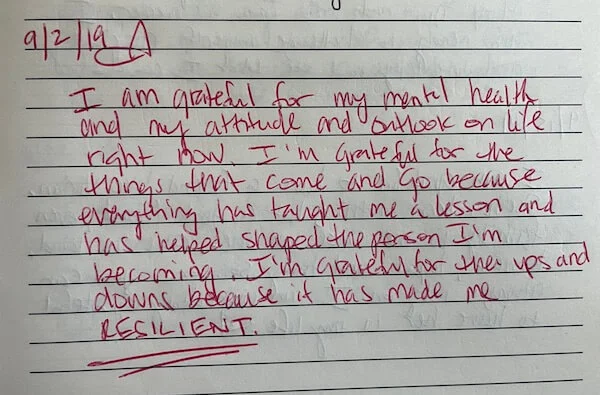
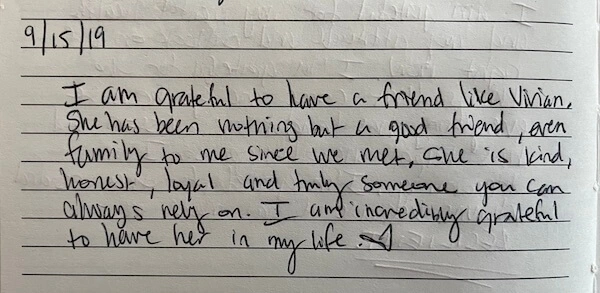
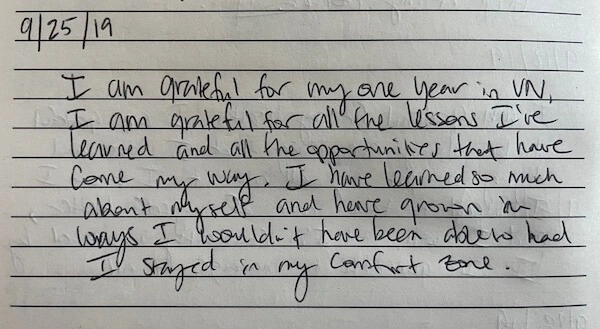
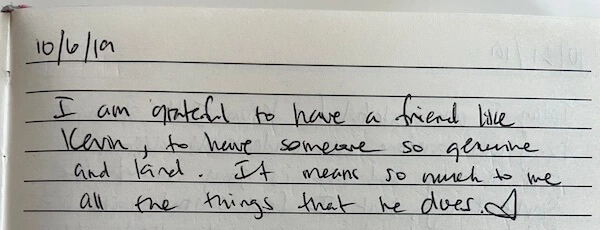
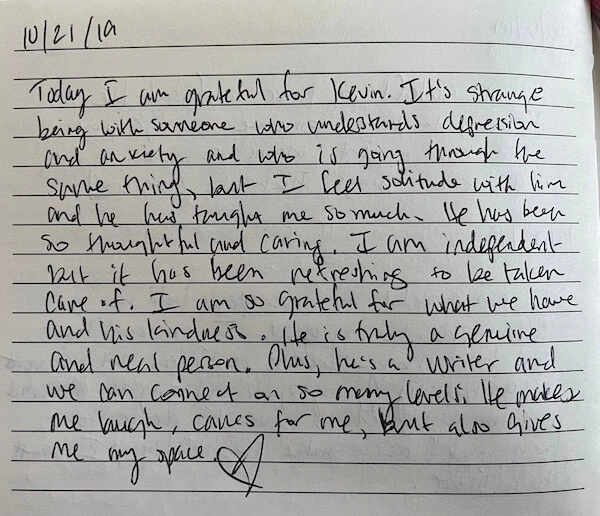
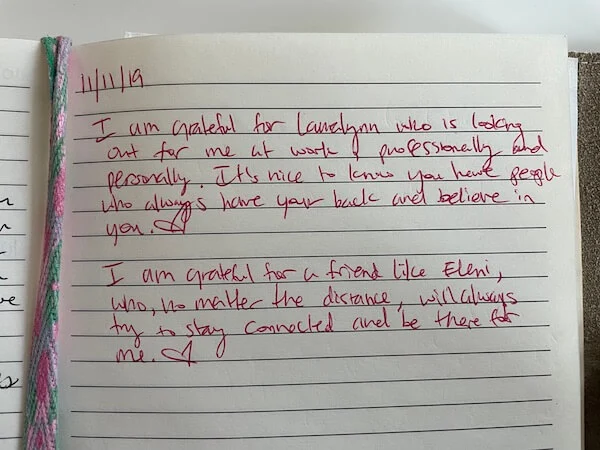
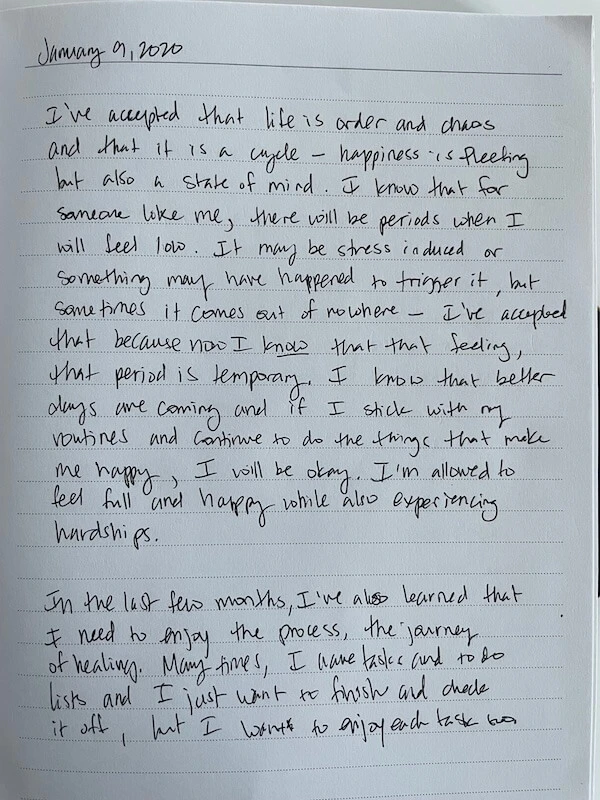
I’ll admit, it’s easier said than done, especially on those days when I’m feeling low for no specific reason. When I sink into periods of depression, it’s hard for me to think about anything positive, anything I can be grateful for. I still have really low days where I’m literally under the covers, curtains drawn, all day long. I’m not sad. I’m just numb and empty, like a body floating in space.
Those are the hardest but most important times to feel gratitude.
Nowadays, regardless of how “off” I’m feeling, or how low my mood is, I force myself to journal about my feelings. Even just writing down all the negativities. I write out every feeling, every word, sometimes as teardrops smear the ink away. I’ve found solitude in writing. And once I’m done writing about my feelings, once I’ve released all of my negative thoughts, I am able to move forward and look ahead to the next moment with hopes that it will get better. In those moments, I am grateful for the growth I’ve made. In those moments, I am grateful for my conscious decision to continue living. And I am grateful for my pain because it was only through that pain that I was able to find strength.
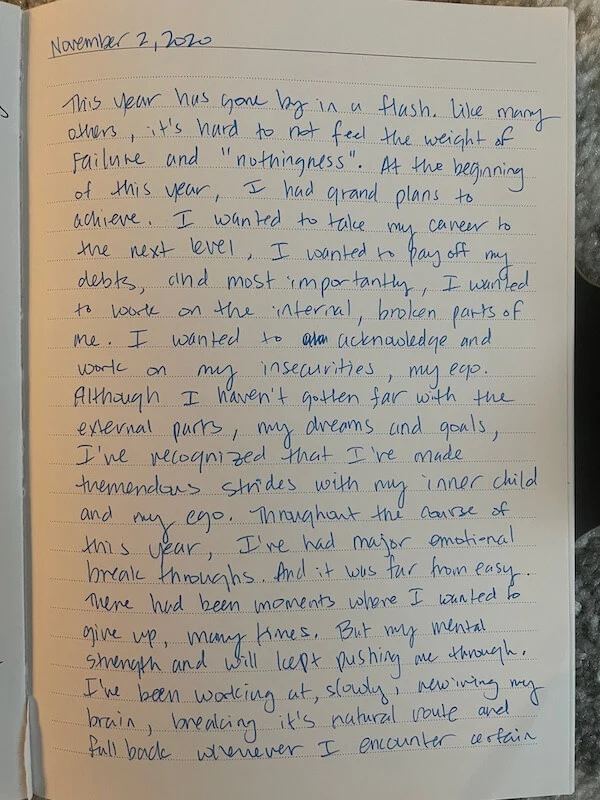
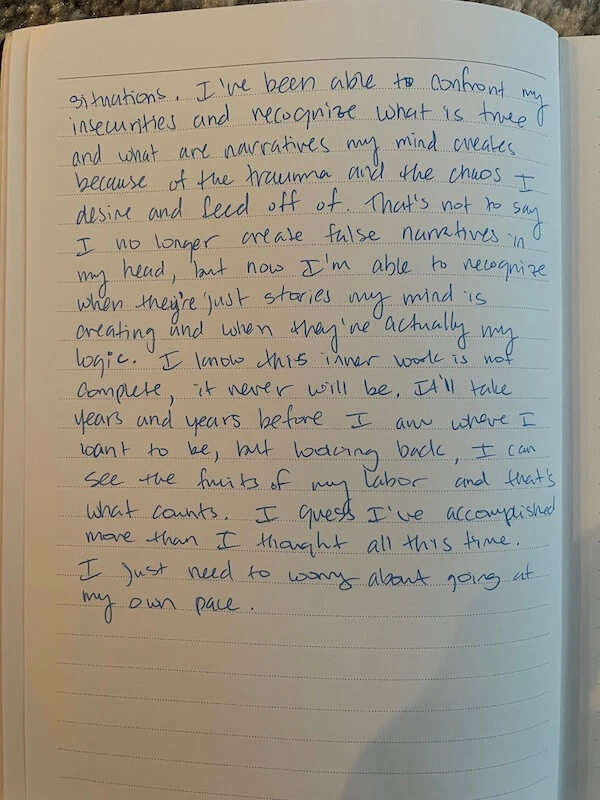
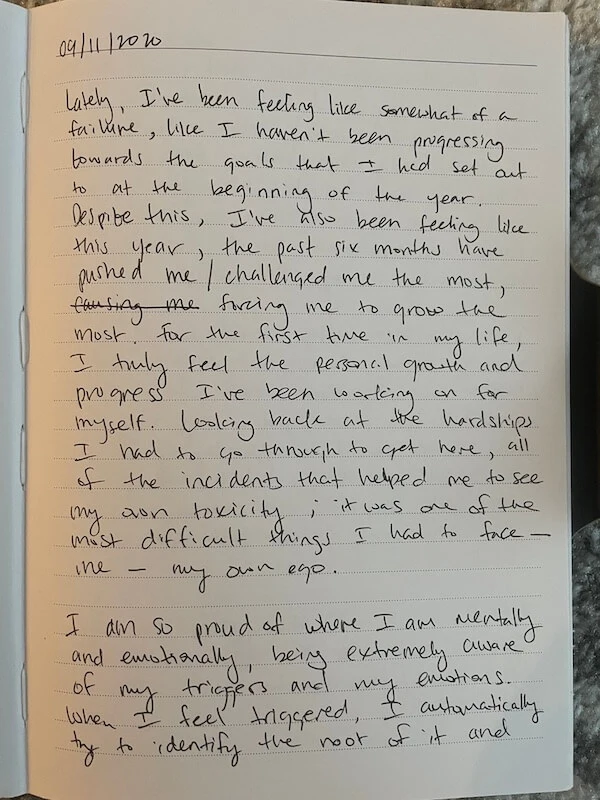
Gratitude has helped me to feel fulfillment. It has helped me to remember the amazing opportunities I have, the incredible people in my life, and the things I have achieved, which I don’t recognize enough because I’m too critical of myself. Gratitude has grounded me in self-empowerment.
So now, my life’s biggest question is no longer “Why do I keep trying to end my life?” It has become “What’s my purpose in living?”
And while I’m still wandering around the cave, it’s not so dark anymore. Finding the flashlight was the first step in my healing journey, lighting the way for a new path, one that’s still uncertain, but filled with gratitude for how far I’ve come.
You know that phrase, “Fake it till you make it”? I used to believe that, especially at the beginning of this journey because I didn’t know how to feel gratitude. But here’s the thing, it’s not a trick. We have so much to be grateful for. We just have to put on the right lens to see it from a different perspective.
Now that you’ve grasped the importance of practicing gratitude, what’s the next step? It’s time to integrate mindfulness into your daily life! Discover how you can embrace mindfulness practices into your everyday routine and unlock their full range of benefits.
